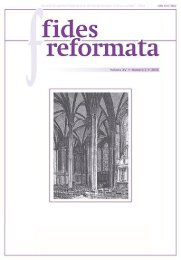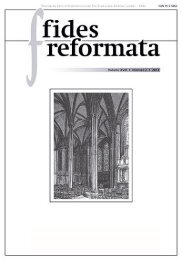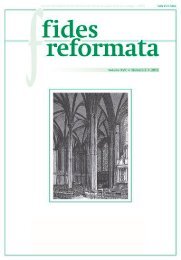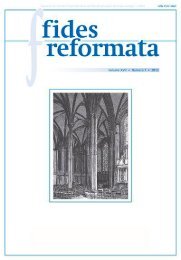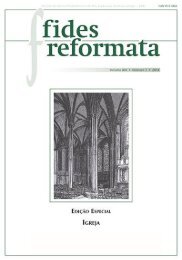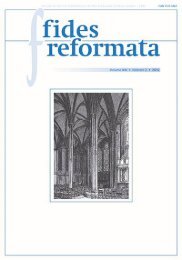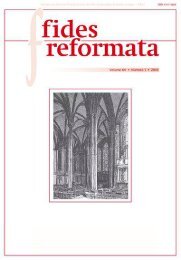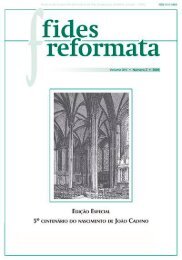You also want an ePaper? Increase the reach of your titles
YUMPU automatically turns print PDFs into web optimized ePapers that Google loves.
P.H.R. (Rob) van Houwelingen, John and the Others<br />
keywords<br />
Fourth Gospel; Gospel of John; “We” passages; Muratorian Canon;<br />
Eyewitnesses.<br />
introduction<br />
The Fourth Gospel is intriguing for its combination of theological and<br />
literary-historical aspects. Theological, by presenting Jesus of Nazareth as a<br />
person of heavenly descent, for already in the prologue the Gospel asserts that<br />
the divine Word became man (1:14). Literary-historical, insofar as the approach<br />
differs from the synoptic tradition, though that <strong>do</strong>es not make the Fourth Gospel<br />
less literary and historical in nature than the synoptic Gospels. Various perspectives<br />
in the past few decades have again drawn attention to what makes John’s<br />
testimony so distinct. 1 This renewed attention to John’s testimony <strong>do</strong>es not take<br />
away from the fact that the Fourth Gospel passes on a particular theological<br />
message: it is written with the explicit aim that the readers may believe that<br />
Jesus is the Christ, the Son of God (20:30-31).<br />
For my working hypothesis I have taken as my starting point the traditional<br />
view that the apostle John was the author of the Fourth Gospel (I will use<br />
‘John’ as the author’s name); that he is also the anonymous beloved disciple<br />
who is frequently mentioned in this gospel; that the Synoptic Gospels precede<br />
the Gospel of John, which according to early Christian tradition was published<br />
in Ephesus as last of the four. Today several other views are maintained, however<br />
they <strong>do</strong> not need to be considered here, since my particular intention is<br />
to offer an interpretation of some texts from the Fourth Gospel.<br />
One view is that of Martin Hengel, which <strong>do</strong>es not consider the apostle<br />
John to be the author and the beloved disciple but the presbyter John, 2 who<br />
would be further a very obscure figure in early Christianity. Neither <strong>do</strong> I agree<br />
with the view that attributes the authorship to the so-called Johannine community,<br />
3 which would mean a collective of writers. And like many others,<br />
1 See e.g. STIBBE, Mark W. John as Storyteller. Narrative Criticism and the Fourth Gospel.<br />
Cambridge: Cambridge University Press, <strong>19</strong>94; BLOMBERG, Craig L. The Historical Reliability of<br />
John’s Gospel: Issues & Commentary. Downers Grove: InterVarsity Press, 2001; BAUCKHAM, Richard.<br />
Jesus and the Eyewitnesses. The Gospels as Eyewitness Testimony. Grand Rapids: Eerdmans, 2006;<br />
BARTHOLOMÄ, Philipp F. The Johannine Discourses and the Teaching of Jesus in the Synoptics: A<br />
Comparative Approach to the Authenticity of Jesus’ Words in the Fourth Gospel. Diss. Heverlee, 2010.<br />
2 HENGEL, Martin. Die johanneïsche Frage: ein Lösungsversuch. Tübingen: Mohr Siebeck, <strong>19</strong>93.<br />
3 Two pivotal publications with this view: MARTYN, Louis L. History and Theology in the Fourth<br />
Gospel. Second, Revised and Enlarged Edition. Nashville: Abing<strong>do</strong>n, <strong>19</strong>79; BROWN, Raymond E.<br />
The Community of the Beloved Disciple. Lon<strong>do</strong>n: Chapman, <strong>19</strong>79. Cf. CULPEPPER, R. Alan. The<br />
Johannine School. Missoula: Scholars Press, <strong>19</strong>75; reprint 2007. A cogent critique of the community<br />
hypothesis has been offered by BAUCKHAM, Richard (ed.). The Gospels for All Christians: Rethinking<br />
the Gospel Audiences. Grand Rapids: Eerdmans, <strong>19</strong>98.<br />
96





